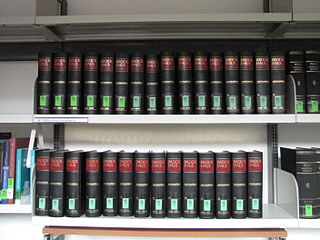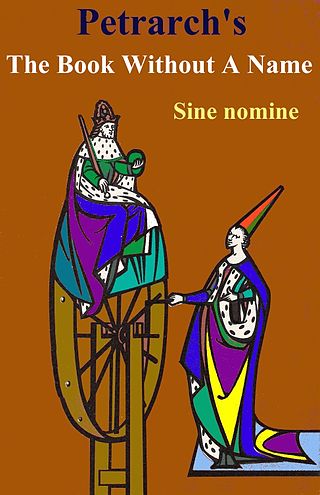Related Research Articles

A reference work is a non-fiction work, such as a paper, book or periodical, to which one can refer for information. The information is intended to be found quickly when needed. Such works are usually referred to for particular pieces of information, rather than read beginning to end. The writing style used in these works is informative; the authors avoid use of the first person, and emphasize facts.

In taxonomy, binomial nomenclature, also called binary nomenclature, is a formal system of naming species of living things by giving each a name composed of two parts, both of which use Latin grammatical forms, although they can be based on words from other languages. Such a name is called a binomial name, a binomen, binominal name, or a scientific name; more informally it is also historically called a Latin name. In the ICZN, the system is also called binominal nomenclature, "binomi'N'al" with an "N" before the "al", which is not a typographic error, meaning "two-name naming system".
In a computer language, a reserved word is a word that cannot be used as an identifier, such as the name of a variable, function, or label – it is "reserved from use". This is a syntactic definition, and a reserved word may have no user-defined meaning.
In musicology, the opus number is the "work number" that is assigned to a musical composition, or to a set of compositions, to indicate the chronological order of the composer's production. Opus numbers are used to distinguish among compositions with similar titles; the word is abbreviated as "Op." for a single work, or "Opp." when referring to more than one work.

Bibliography, as a discipline, is traditionally the academic study of books as physical, cultural objects; in this sense, it is also known as bibliology. English author and bibliographer John Carter describes bibliography as a word having two senses: one, a list of books for further study or of works consulted by an author ; the other one, applicable for collectors, is "the study of books as physical objects" and "the systematic description of books as objects".
Prepositions and postpositions, together called adpositions, are a class of words used to express spatial or temporal relations or mark various semantic roles.

In publishing, a colophon is a brief statement containing information about the publication of a book such as an "imprint".

This page is a glossary of library and information science.

Latino sine flexione, Interlingua de Academia pro Interlingua or Peano's Interlingua is an international auxiliary language compiled by the Academia pro Interlingua under the chairmanship of the Italian mathematician Giuseppe Peano (1858–1932) from 1887 until 1914. It is a simplified version of Latin, and retains its vocabulary. Interlingua-IL was published in the journal Revue de Mathématiques in an article of 1903 entitled De Latino Sine Flexione, Lingua Auxiliare Internationale, which explained the reason for its creation. The article argued that other auxiliary languages were unnecessary, since Latin was already established as the world's international language. The article was written in classical Latin, but it gradually dropped its inflections until there were none.

The versine or versed sine is a trigonometric function found in some of the earliest trigonometric tables. The versine of an angle is 1 minus its cosine.

The Great Seal of the State of Colorado is an adaptation of the territorial seal which was adopted by the First Territorial Assembly on November 6, 1861. The only changes made to the territorial seal design being the substitution of the words, "State of Colorado" and the figures "1876" for the corresponding inscriptions on the territorial seal. The first General Assembly of the State of Colorado approved the adoption of the state seal on March 15, 1877. The Colorado Secretary of State alone is authorized to affix the Great Seal of Colorado to any document whatsoever.
Sine qua non or condicio sine qua non is an indispensable and essential action, condition, or ingredient. It was originally a Latin legal term for "[a condition] without which it could not be", "but for...", or "without which [there is] nothing." Also, "sine qua non causation" is the formal terminology for "but-for causation."
In information science, authority control is a process that organizes information, for example in library catalogs, by using a single, distinct spelling of a name (heading) or an identifier for each topic or concept. The word authority in authority control derives from the idea that the names of people, places, things, and concepts are authorized, i.e., they are established in one particular form. These one-of-a-kind headings or identifiers are applied consistently throughout catalogs which make use of the respective authority file, and are applied for other methods of organizing data such as linkages and cross references. Each controlled entry is described in an authority record in terms of its scope and usage, and this organization helps the library staff maintain the catalog and make it user-friendly for researchers.
Op. cit. is an abbreviation of the Latin phrase opus citatum or opere citato, meaning "the work cited" or in the cited work, respectively.
Parenthetical referencing is a citation system in which in-text citations are made using parentheses. They are usually accompanied by a full, alphabetized list of citations in an end section, usually titled "references", "reference list", "works cited", or "end-text citations". Parenthetical referencing can be used in lieu of footnote citations.

The Liber sine nomine is a collection of nineteen personal letters written in Latin by the fourteenth century Italian poet and Renaissance humanist Petrarch. The letters being harshly critical of the Avignon papacy, they were withheld from the larger collection of his Epistolae familiares and assembled in a separate book. In this fashion, Petrarch reasoned, a reader could throw away this collection, and the other letters to friends could be preserved for posterity.
The Missa Sine nomine is a setting of the Ordinary of the Mass by Renaissance composer Josquin des Prez. It is a work of his maturity, probably dating from the period after he returned to Condé-sur-l'Escaut in 1504. It is one of Josquin's only masses not to be based on pre-existing material, and like the Missa ad fugam, it is a canonic mass.
A postpositive adjective or postnominal adjective is an adjective that is placed after the noun or pronoun that it modifies, as in noun phrases such as attorney general, queen regnant, or all matters financial. This contrasts with prepositive adjectives, which come before the noun or pronoun, as in noun phrases such as red rose, lucky contestant, or busy bees.
The Misa Sine Nomine is a 1977 musical work for narrator, mixed choirs with up to 36 voices, organ, and percussion by Leon Schidlowsky. It was composed in memory of Chilean folk singer and human rights activist Víctor Jara. The work is a setting of parts of the mass ordinary juxtaposed with Biblical passages in Hebrew, and texts in other languages by various contemporary authors, including by the composer himself. The composition is in eleven movements and utilizes different groupings of performers in each. The score uses graphic notation. The movements, which can be performed separately, are meant to be accompanied by visual projections. It was first performed in Hamburg in 1980.
References
- ↑ "A brief overview of some of the changes from AACR2 to RDA". Yale University Library. 26 June 2014. Retrieved 17 October 2014.